BIOGRAPHY
| Winn, Raynor | Landlines |
Return to top
COOKING
| Bero, Nornie | Mabu mabu |
| Maehashi, Nagi | Dinner |
 Mabu Mabu: An Australian Kitchen Cookbook by Nornie Bero
Mabu Mabu: An Australian Kitchen Cookbook by Nornie Bero
In Mabu Mabu, charismatic First Nations chef Nornie Bero champions the tastes of native flavours in everyday cooking by unlocking the secrets of Australian herbs, spices, vegetables and fruits. Nornie grew up on the island of Mer in the Torres Strait and while her wanderlust would take her to Italian and Japanese kitchens in Melbourne and London via Townsville, her home now is Mabu Mabu, a restaurant renowned in Melbourne and beyond for its innovative and delicious Australian Indigenous food. This book, also called Mabu Mabu – which means help yourself – reflects Nornie’s approach to cooking: simple, accessible, delicious, and colourful! Her native pantry (explored in a comprehensive glossary of native ingredients) includes seeds, succulents, nuts, plants and herbs, and her recipes range from Pumpkin and Wattleseed dampers (for which she is known) to Kangaroo Tail Bourguignon to Saltbush Butter, Quandong Relish, Pickled Karkalla and Pulled Wild Boar. Nornie also shares her knowledge of foraging, sourcing and substitutions, as well as the story of her formative years foraging, fishing and cooking alongside her beloved father on Mer. Readings, 2022
Return to top
GENERAL FICTION
| Archer, Jeffrey | Next in line |
| Baldacci, David | Long shadows |
| Booth, Sharron | The silence of water |
| Child, Lee | No plan B |
| Cohen, Joshua | The Netanyahus |
| Dandy, Angela | The silver sting |
| De Mille, Nelson | The maze |
| Everett, Percival | The trees |
| Garner, Alan | Treacle Walker |
| Haddon, Cole | Psalms for the end of the world |
| Homes, A. M. | The unfolding |
| Karunatilaka, Shehan | The seven moons of Maali Almeida |
| Keegan, Claire | Small things like these |
| Lien, Tracey | All that’s left unsaid |
| MarÃas, Javier | Poison, shadow and farewell |
| Ng, Celeste | Our missing hearts |
| Ozeki, Ruth | The book of form and emptiness |
| Reid, Diana | Seeing other people |
| Ringland, Holly | The seven skins of Esther Wilding |
| Robards, Karen | The girl from Guernica |
| Seymour, Gerald | The foot soldiers |
| Shamsie, Kamila | Best of friends |
| Steel, Danielle | The high notes |
| Strout, Elizabeth | Lucy by the sea |
| Toews, Miriam | Fight night |
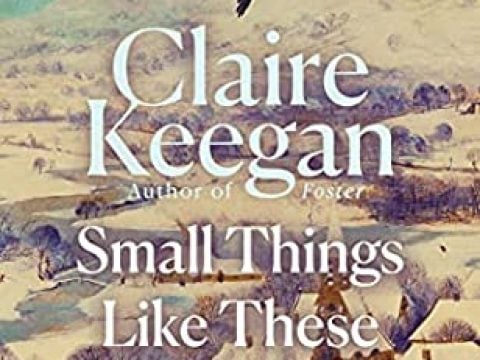 Small Things Like These by Claire Keegan
Small Things Like These by Claire Keegan
Irish story writer Keegan’s gorgeously textured second novella (after Foster) centers on a family man who wants to do the right thing. It’s almost Christmas in a small town south of Dublin, Ireland, in 1985. Bighearted coal dealer Bill Furlong makes deliveries at all hours, buys dinner for his men, plays Santa Claus for the local children, and cares for his five daughters along with his wife, Eileen. Meanwhile, rumors circulate about the “training school” at a nearby convent, suggesting it’s a front for free labor by young unwed mothers to support a laundry service, but no one wants to rock the boat. When Bill is there on a delivery, a teenage girl begs him to take her with him, and he politely makes excuses. He also notices broken glass topping the walls. Eileen tells him to “stay on the right side of people,” but he feels he should do something—not just because he imagines his own daughters imprisoned there, but because he was born to a 16-year-old unwed mother who could have suffered a similar fate. Keegan beautifully conveys Bill’s interior life as he returns to the house where he was raised (“Wasn’t it sweet to be where you were and let it remind you of the past… despite the upset”). It all leads to a bittersweet culmination, a sort of anti–Christmas Carol, but to Bill it’s simply sweet. Readers will be touched. Publisher’s Weekly, August 2021
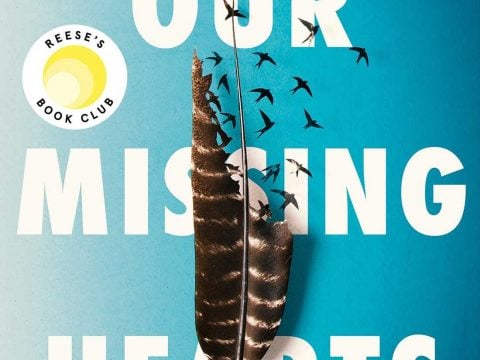 Our missing hearts by Celeste Ng
Our missing hearts by Celeste Ng
Ng’s remarkable dystopian latest (after Little Fires Everywhere) depicts draconian family separation tactics and a normalizing of violence against Asians and Asian Americans in an alternate present. In the wake of the nativist PACT act (Preserving American and Culture Traditions), a piece of legislation that opposes foreign cultural influences, the U.S. government begins reassigning custody of children whose parents are accused of being un-American. Twelve-year-old Bird Gardner lives with his white father, Ethan, a former Harvard language teacher who now shelves books in the university’s library. Bird’s mother, Margaret Miu, a Chinese American poet, vanished three years earlier after her work became seen as subversive. Out of the blue, Bird receives a mysterious drawing from her, reminding him of a fairy tale she used to tell him, which he’s mostly forgotten. In a world where neighbors spy on each other and people with Asian features are frequently attacked on the street, Ethan has long instructed Bird to lay low. But nothing can stop him from looking for Margaret. While searching for a book that might contain the story Margaret used to tell him, he discovers a network of librarians who secretly collect information about children seized from their families and learns how Margaret’s work inspired anti-PACT art demonstrations. Ng crafts an affecting family drama out of the chilling and charged atmosphere, and shines especially when offering testimony to the power of art and storytelling (here’s Bird remembering the fairy tale in his mother’s voice, “painting a picture with words on the blank white wall of his mind. Long buried. Crackling as it surfaced in the air once more”). Like Margaret’s story, Ng’s latest crackles and sizzles all the way to the end. Publisher’s Weekly, July 2022
 Lucy by the Sea by Elizabeth Strout
Lucy by the Sea by Elizabeth Strout
Strout follows up Oh William! with a captivating entry in the Lucy Barton series. This time, Lucy decamps to rural Maine during the first year of the Covid lockdown. At the pandemic’s onset in 2020, Lucy’s philandering ex-husband and longtime friend, William, whisks her away from New York City to a rental house in coastal Maine. He may have self-centered ulterior motives beyond his assertion that he’s trying to save her life, but they are not readily transparent for most of the narrative. Personal and public events intrude during the lockdown as the pair develop a “strange compatibility” while attempting to comprehend the new normal. Their two daughters each face a crisis in their marriage; William contacts his once unknown half sister, Lois Bubar, and reveals a life-threatening medical condition; and the country roils from George Floyd’s murder and the insurrection on January 6. Bleak memories of Lucy’s impoverished childhood and of her recently deceased husband surface in shattering flashbacks. Loneliness, grief, longing, and loss pervade intertwined family stories as Lucy and William attempt to create new friendships in an initially hostile town. What emerges is a prime testament to the characters’ resilience. With Lucy Barton, Strout continues to draw from a deep well. Publisher’s Weekly, June 2022
Return to top
HISTORICAL FICTION
| Haynes, Natalie | Stone blind |
| North, Claire | Ithaca |
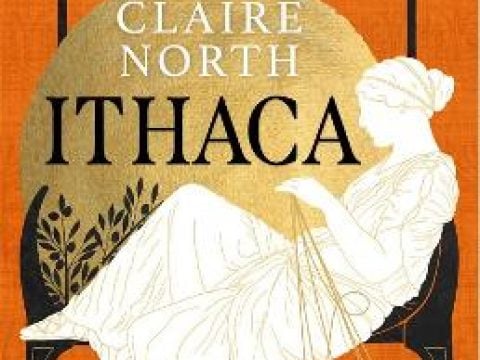 Ithaca by Claire North
Ithaca by Claire North
The queen of the gods narrates a crackling tale of secrets and intrigue. Penelope has a problem—a few, in fact. First, there are the suitors: about a hundred men who trespass on her hospitality, waiting for her to admit that her husband, Odysseus, is dead and choose a new king of Ithaca. And then there are the pirates who’ve been harrying the coast, the fact that Ithaca has no men of fighting age to defend it, and the troubling possibility that one of the suitors has sent the pirates to pressure her into capitulating. Perhaps her biggest problem—or opportunity—is that she’s a woman, and even as a queen she’s expected to stay out of matters of state. As told by Hera, queen of the gods. Penelope’s story is one of secrets, of women working in the shadows, unnoticed and underestimated. As Penelope herself puts it, “The greatest power we women can own, is that we take in secret.” Hera is an appealingly involved narrator with a biting tongue (“Every little twerp is descended from Heracles these days”). She picks favorites, she complains, she nudges, she rails against her own reduced position among the gods. And she weaves a great yarn. More straightforward and more visceral than much of North’s recent work, this is a ground-up view of Greek myth populated by spying maids, crafty merchants, and conniving queens. It’s taut, suspenseful, and full of Hera’s delightfully dyspeptic attitude. A thoroughly enjoyable exploration of Penelope’s side of the ancient story. Kirkus Review, September 2022
Return to top
MYSTERY
| Adler-Olsen, Jussi | The shadow murders |
| Ahnhem, Stefan | The final nail |
| Beaton, M. C. | Death of a green-eyed monster |
| Benedict, Alexandra | The Christmas murder game |
| Box, C. J. | Treasure State |
| Childs, Laura | Twisted tea Christmas |
| Cornwell, Patricia Daniels | Livid |
| Finch, Paul | Never seen again |
| Gagnon, Jilly | The Murder Weekend |
| Griffiths, Elly | Bleeding heart yard |
| Kellerman, Faye | The hunt |
| Kelly, Jim | The night raids |
| Klingborg, Brian | Wild prey |
| McGovern, Petronella | The liars |
| Nesser, Håkan | The axe woman |
| Onda, Riku | Fish swimming in dappled sunlight |
| Papathanasiou, Peter | The invisible |
| Perry, Anne | Three debts paid |
| Rankin, Ian | A heart full of headstones |
| Simpson, Roger | Transgression |
| Tuti, Ilaria | Painted in blood |
| Walker, Martin | To kill a troubadour |
| Whitelaw, Jonathan | The bingo hall detectives |
| Yokomizo, Seishi | Death on Gokumon Island |
| Mics. | Dark deeds down under |
 Bleeding Heart Yard by Elly Griffiths
Bleeding Heart Yard by Elly Griffiths
A reunion of the class of 1998 at London’s posh Manor Park school, “where trendy lefties send their kids,” provides the backdrop for this stunning standalone from Edgar winner Griffiths (The Postscript Murder). One attendee, Det. Sgt. Cassie Fitzherbert, believes she pushed a classmate to his death on the rails of an abandoned underground tube station 21 years earlier, but could her memory be faulty? At Manor Park, Cassie was close friends with members of the Group, who used to meet in the attic of the home of Garfield Rice, now a Conservative MP. Every Group member has since had a successful career, except for EFL teacher Anna Vance, who’s “definitely hiding something.” Past crushes, jealousies, and buried passions surface, culminating in Rice’s “unexplained” death in the loo, traces of cocaine on his lips. The stabbing murder of another MP at a dining club in Bleeding Heart Yard, a courtyard in Holborn, raises the stakes. Jaw-dropping red herrings, headbanging twists and turns, and Rashomon-like alternating narratives add to the briskly paced plot, which builds to a reconstruction of the original crime and a bombshell revelation. Donna Tartt fans won’t be able to put this one down. Publisher’s Weekly, September 2022
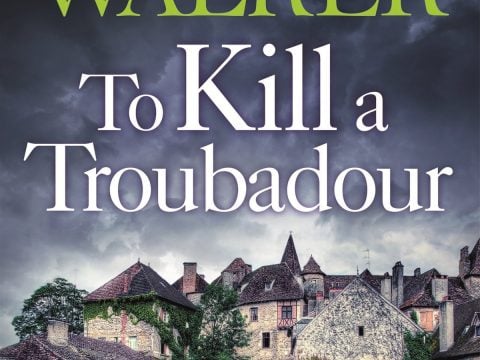 To kill a troubadour by Martin Walker
To kill a troubadour by Martin Walker
An international incident propels Walker’s taut 15th novel featuring Bruno Courrèges, the chief of police of the small French town of St. Denis (after 2021’s The Coldest Case). A week before Périgord folk band Les Troubadours is scheduled to perform in St. Denis, their new hit, Song for Catalonia, is banned by the Spanish government for encouraging the Catalan region to continue pushing for independence from Spain. The situation escalates exponentially with the spread of fake news on Spanish social media linked to Russia’s campaign to stir up divisions in Europe. The musicians’ website and Twitter feeds are soon overflowing with hateful comments and even death threats. Bruno begins to suspect that the song’s composer may be a target for terrorists when the band performs in his town. Smoothly integrated into Bruno’s investigation is information on a multitude of subjects, from medieval musical instruments to Ukrainian history, plus easy-to-follow recipes such as the British classic Coronation Chicken and Bruno’s Gazpacho. Good food, fascinating history, and a crackerjack mystery: who could ask for more? Publisher’s Weekly, May 2022
 Twisted tea Christmas by Laura Childs
Twisted tea Christmas by Laura Childs
With several Christmas-themed teas booked for the month, Theodosia Browning, owner of the Indigo Tea Shop in Charleston, S.C., is looking forward to a busy December, in Childs’s uneven 23rd Tea Shop mystery (after Haunted Hibiscus). The season gets off to an inauspicious start, however, when Theodosia discovers 85-year-old Drucilla Heyward dead at the society woman’s own charity fundraiser, her diamond rings stripped off her fingers and a priceless Renoir painting missing. Miss Drucilla’s personal assistant asks Theodosia for help figuring out whodunit, so between Christmas catering jobs, Theodosia and her ever-patient tea sommelier, Drayton Conneley, question witnesses and snoop for clues, do a little light breaking and entering, dodge a few bullets, and dig up an extra body the police seem to have missed. Theodosia’s appealing tea shop, the warm ambiance of Charleston at Christmastime, and the fabulous recipes Child includes at the end help compensate for the unconvincing plot and Theodosia’s annoying conviction that she’s a better investigator than the police. Cozy lovers will be hungry for more. Publisher’s Weekly, August 2022
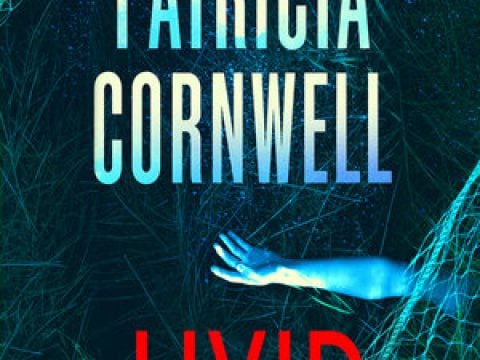 Livid by Patricia Cornwell
Livid by Patricia Cornwell
Another 15 rounds for Virginia chief medical examiner Dr. Kay Scarpetta and her well-placed enemies past and present. Why is her old law school roommate, Judge Annie Chilton, allowing Alexandria’s Commonwealth’s Attorney Bose Flagler to beat up Scarpetta on the witness stand? Normally the state’s CME would be on the prosecutor’s side, but this time Scarpetta is determined to testify that her predecessor, the late Dr. Bailey Carter, who had rapid-onset dementia, mistakenly called beauty queen April Tupelo’s drowning murder, leading to the arrest of her live-in Romeo, Gilbert Hooke. Even so, Chilton’s rulings seem consistently heedless of Scarpetta’s formidable reputation and personal feelings, as if the judge were distracted by something. Maybe she’s having previsions about her sister, CIA press secretary Rachael Stanwyck, who’s soon found dead in the kitchen of the judge’s family estate, rendering the introductory case moot to everyone but the protesters who attack Scarpetta, bellowing “JUSTICE FOR APRIL!” and providing the media with more anti-Scarpetta grist. Certainly Cornwell seems to forget about it in her eagerness to linger over the diabolical, state-of-the-art murder weapon by which the judge’s sister met her doom and to evoke the endless infighting among Scarpetta, her nemesis, Virginia health commissioner Dr. Elvin Reddy, and his minions. A second (or is it a third?) murder provides the basis for more of the post-mortem set pieces that make fans of this long-running series salivate, and it’s especially gratifying to see Scarpetta wring important evidence from a dust bunny. But the forensics mean more to Cornwell than the suspects, and the ideal reader of this installment won’t care any more than she does whodunit. As usual, the dead are just more interesting than the living. Something to look forward to. Kirkus Review, September 2022
Return to top
NON FICTION
| Clode, Danielle | Koala |
| Dixson-Declève, Sandrine | Earth for all |
| Gillard, Julia | Not now, not ever |
| Hooper, Chloe | Bedtime story |
| McCormack, Catherine | The art of looking up |
| Morgan, Glyn | SCIENCE FICTION |
| Rawlings, Alex | From amourette to Zaal |
| Young, Damon | The art of reading |
 The Art of Reading by Damon Young
The Art of Reading by Damon Young
Philosopher Young (Philosophy in the Garden) investigates the act of reading with essays on six virtues he sees exemplified by it—namely curiosity, patience, courage, pride, temperance, and justice—in this brisk and delightful collection. Its short length belies a book heavy with insight, creativity, and wit. To Young’s credit, he treats all types of reading, from scholarly meditation to frivolous binge reading, with seriousness and respect. His literary examples include both highbrow works, such as Jorge Luis Borges’s “The Library of Babel” and Blaise Pascal’s Pensées, and beach reads, such as Star Trek novelizations and The Da Vinci Code. The essays vary in their tightness and persuasiveness—some hew quite closely to their featured virtue and give analyses that feel acute and surprising, while others have less well-defined theses—but all uniformly entertain. Young sometimes uses scholarly language (“If curiosity like Borges’s resists the inertia of being, Heidegger’s was a characteristic rejection of stubborn facts altogether”) that requires close attention and even rereading, but his thoughts are lucid and accessible, repaying the reader’s work. Moreover, the closing bibliographic essay will inspire reading lists for months to come. This literary study is serious but also witty and fun—a tough balance to strike, but Young nails it. Publisher’s Weekly, January 2018
Return to top
SCIENCE FICTION & FANTASY
| Muir, Tamsyn | Nona the ninth |
| Novik, Naomi | The golden enclaves |
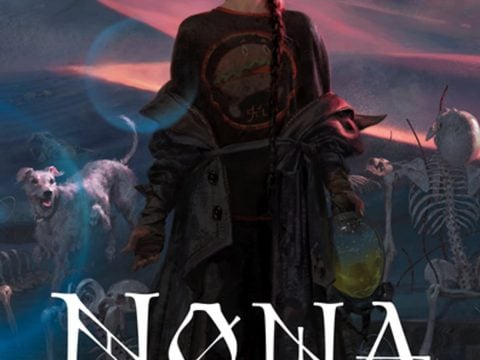 Nona the ninth by Tamsyn Muir
Nona the ninth by Tamsyn Muir
Muir tackles a new perspective in this characteristically brilliant successor to Harrow the Ninth, which offers a much more personal and tightly framed focus than the rest of the Locked Tomb series. Nona’s been alive for six months with no memory of who she was before awakening in her new body. She enjoys working as a teacher’s aide, petting dogs, and hanging out with her squad of friends, and she has no desire to reckon with the world beyond her comfortable little life: the zombies, the resettlements, the giant blue sphere that hangs above her planet. But whether she likes it or not, Nona’s true identity is the key that shapes the empire, and with that empire in disarray, every force in the universe has their eyes on her, fixated on who she may have been and who she could become. Muir’s skill is such that readers will be desperate to find out the truth of Nona’s background but will still savor the quiet moments with this heartbreaking character. Nona’s lovely, simple, and occasionally silly voice works especially well in juxtaposition with the dark, dense backdrop of the series so far, creating a riveting contrast. Readers will be on the edges of their seats. Publisher’s Weekly, September 2022
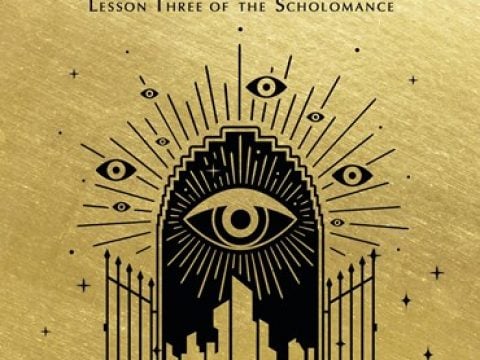 The golden enclaves by Naomi Novik
The golden enclaves by Naomi Novik
Novik dazzles in her brilliant and compulsively readable final Scholomance fantasy, which picks up immediately after the events of The Last Graduate. Galadriel “El” Higgins has successfully trapped 92% of all wizard-hunting monsters, or mals, in the magical boarding school Scholomance, now her alma mater, and led her fellow students to safety—all except for her enemy turned true love, Orion Lake. El’s desperate attempts to save Orion from a fate worse than death in the belly of the same “maw-mouth” monster that ate her father can’t succeed unless she gets power from the enclaves, groups of privileged wizards living in protective pocket universes. However, several enclaves have mysteriously vanished into the void, the powerful London enclave is under attack, and the New York and Shanghai enclaves are on the brink of war. To save Orion, El and her classmates must first save the world they have struggled so hard to rejoin and a future threatened by dangers built into the foundations of the enclaves themselves. This exquisitely well-crafted work engages deeply with genre classics like the Lord of the Rings and The Ones Who Walk Away from Omelas while offering up its own detailed and original world full of clever parallels and a fascinating magical catch-22. Novik beautifully closes out El’s and Orion’s character arcs, paying off on groundwork laid in previous installments, and her focus on hope, resilience, and collective action makes this finale as moving as it is satisfying. This is a knockout. Publisher’s Weekly, July 2022
Return to top
New additions to eBooks at SMSA
EBOOKS
| General | Unger, Lisa | Secluded Cabin Sleeps Six |
| General | Wakefield, Vikki | After You Were Gone |
| Mystery | Disher, Garry | Day’s end |
| Mystery | Hill, Reginald | Dalziel and Pascoe Hunt the Christmas Killer & Other Stories |
| Mystery | Manansala, Mia | Blackmail and bibingka |
| Mystery | Nossett, Lauren | The Resemblance |
| Mystery | Penrose, Andrea | Murder at the Serpentine Bridge |
| Mystery | Pine, Alex | The Killer in the Snow |
| Mystery | Slaughter, Karin | The last widow |
| Mystery | Trinchieri, Camilla | The Bitter Taste of Murder |
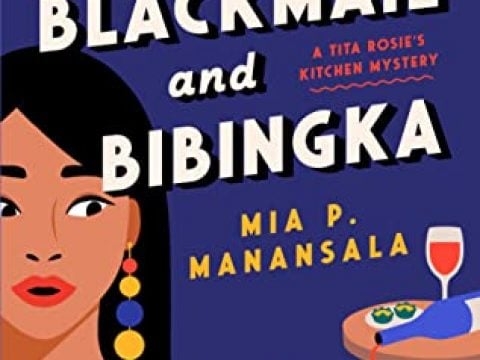 Blackmail and Bibingka by Mia Manansala
Blackmail and Bibingka by Mia Manansala
In Agatha Award winner Manansala’s cheeky third culinary cozy (after Homicide and Halo-Halo), the trouble begins with the return of restaurant owner Lila Macapagal’s prodigal cousin, Ronnie Flores, during the annual Winter Bash in Shady Palms, Ill. After a 15-year absence and a suspicious stay in Florida, the “king of get-rich-quick schemes” has heady plans to buy a nearby winery and hawk a line of traditional vintages, especially a potentially lethal lambanog. He has lined up a group of out-of-town investors, including the “expensively beautiful” Denise Sutton and her suave fiancé, Xander Cruz. Things go awry quickly when Denise imbibes too much and dies. Denise’s twin stepchildren immediately suspect Xander of money-grubbing. But when Lila’s aunt, Tita Rosie, receives an email threatening to expose what happened in Florida with the claim that “Ronnie and Co. have blood on their hands,” amateur detective Lila widens the net. The sleuthing sometimes takes a back burner to food tastings, but Manansala’s breezy style makes for another brisk entry in this flavorful series, recipes included. Readers will be hungry for more. Publishers Weekly, August 2022
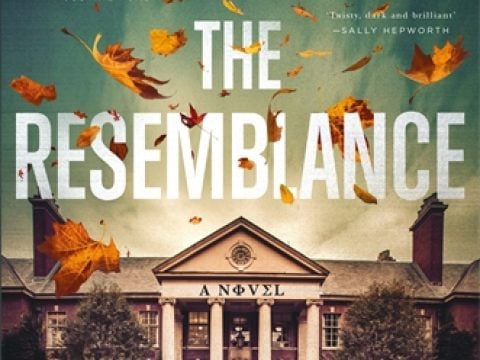 The resemblance by Lauren Nosset
The resemblance by Lauren Nosset
Det. Marlitt Kaplan—the 29-year-old narrator of Nossett’s impassioned if overwrought debut—is tired of being sidelined by her paternalistic boss, so she’s elated to be first on the scene of a fatal hit-and-run at the University of Georgia in her hometown of Athens. According to witnesses, Kappa Phi Omicron member Jay Kemp was crossing the street when a car driven by his smiling doppelgänger accelerated in order to strike him. Marlitt despises fraternities for something that happened while she was in college, and suspects KPO is somehow responsible for Jay’s death—particularly after one of the brothers wipes Jay’s laptop before police can examine it. She begins obsessively investigating Jay’s fellow KPO members, despite doubts from coworkers, admonitions from her supervisor, and escalating threats against Marlitt and her police partner. Nossett delivers a scathing indictment of Greek life cloaked in a twisty mystery rife with red herrings. The plot is overly busy and a convoluted denouement strains credulity, but Marlitt’s fanatical first-person voice adds urgency and focus. Nossett is off to a solid start. Publishers Weekly, August 2022
Return to top
AUDIOBOOKS
| General | Khavari, Kate | A Botanist’s Guide to Parties and Poisons |
| General | MacDonald, Dee | The golden oldies guesthouse |
| Mystery | Belli, Kate | Deception by Gaslight |
| Mystery | Bishop, Claudia | A Dash of Death |
| Mystery | Dark, Rylie | Only Once |
| Mystery | Golden, S. K. | The Socialite’s Guide to Murder |
| Mystery | Graham, Heather | Aura of Night |
| Mystery | Greene, Morgan | Death chorus |
| Mystery | Padavona, Dan | Her last breath |
| Mystery | Sullivan, Tim | The Dentist |
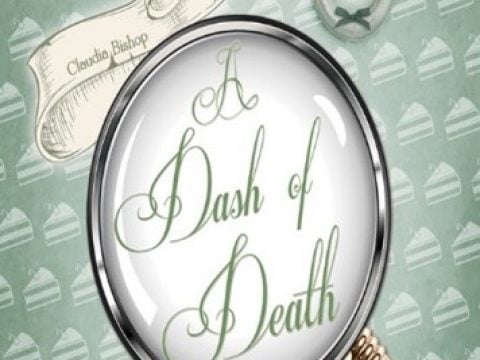 A dash of death by Claudia Bishop
A dash of death by Claudia Bishop
A purveyor of artisanal bitters gets tangled up in murder. As cozy heroines continue to get kicked to the curb by callous significant others, their alternative careers get more and more niche. Samantha Warren, seeing her wedding canceled by her fiance’s cold feet, finds herself in possession of 300 tiny bottles of homemade bitters originally destined for her guests’ swag bags. With the help of her friends Marisa Lopez and Beth Myerson, Sam wangles an invitation from Bob Randall, of the Houston Historic Commission, to be one of the guest servers at the Highlands Historic Home Tour. Hoping that this gig will help her dispose of her unwanted stash and build goodwill for her hobby/new profession–not as a chef, not even as a vintner, but as a bitters maker–Sam is completely unprepared when Mark Brantwell, one of her samplers, dies inauspiciously after one drink. To add insult to injury, Brantwell’s estranged wife, Gabby, files for damages not only against the Historic Commission, but against Sam individually. David Dwyer, a lawyer recommended by her ex-fiance, assures her that the suit will be dismissed quickly, but when it isn’t, Sam decides that she’d better crack the case herself. Klump whips up all the standard ingredients–plucky heroine, nasty ex, supportive pals, intriguing new guy, dangerous killer–into a brew. Publishers Weekly, November 2021
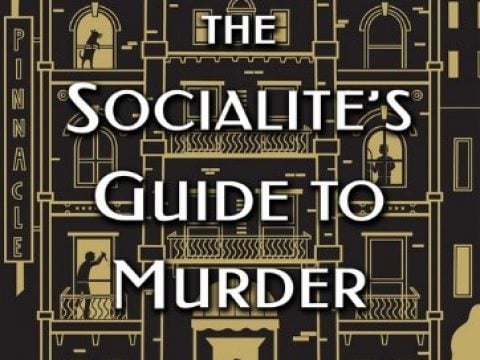 The socialite’s guide to murder by S. K. Golden
The socialite’s guide to murder by S. K. Golden
Golden’s debut dives back into 1958 Manhattan in pursuit of a killer who’s stalking the Pinnacle Hotel. Maybe lounging around would be more exact than stalking, since the leisurely felonies kick off with the head-scratching theft of painter Billie Bell’s hefty latest canvas during a crowded reception where nobody notices a thing. Evelyn Elizabeth Grace Murphy, daughter of the Pinnacle’s absent owner, is concerned when suspicion falls on Henry Fox, an old movie-star friend whose official story is that he’s in love with her. She needn’t worry, though, since Billie’s fatal stabbing with a knife inscribed with head security guard Phil Hall’s initials leads to Phil’s arrest instead. Convinced that neither of them could possibly be guilty, Evelyn, a shameless clotheshorse who artlessly observes, “I wore whatever Marilyn Monroe was wearing,” joins forces with bellhop Mac Cooper, her secret love, and Amelia, the precocious 8-year-old stepdaughter of a visiting French diplomat, to discover the truth. For her pains, her room is broken into and ransacked and the brakes on her Rolls tampered with. But Evelyn, who’s always been good at finding things even though she realizes midway through her first case that she’s clinically agoraphobic, unmasks the killer at a climactic gathering at which she exults, “Poirot always does this,” en route to a nifty final twist that’s the high point of the so-so plot. When the heroine’s father scolds her at the end for spending so much money, you have to sympathize. A catty yet decorous whodunit festooned with period trappings. Kirkus Reviews, August 2022


